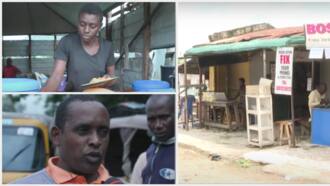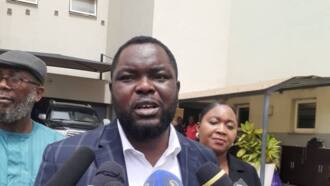How We Enrol 'Drop-out-Married' Girls into Schools in Kano Community, Father Highlights
- Parents in Tarda community in Ungogo local government area of Kano state have adopted different measures to ensure their girls are not enrolled but stay in school to complete their basic education
- One of such parents is Mustapha Abdullahi Tarda whose focus is on making sure that girls who were married off earlier go back to school
- Also, mothers in the community encourage each other through an association supported by United Nations Children’s Fund and the Foreign, Commonwealth and Development Office
PAY ATTENTION: Click “See First” under the “Following” tab to see Legit.ng News on your Facebook News Feed!
Mustapha Abdullahi Tarda, a father of four girls, all of whom are enrolled in one level of education or the other, has a realistic dream of having every girl-child in school irrespective of location or class.
For Abdullahi, an Islamic teacher and the chairman of the School-Based Management Committee (SBMC) in Tarda community of Ungogo local government area of Kano state, said he has seen first-hand how one of his daughters who has completed her Nigeria Certificate In Education (NCE) has become independent and makes informed decisions about her life.
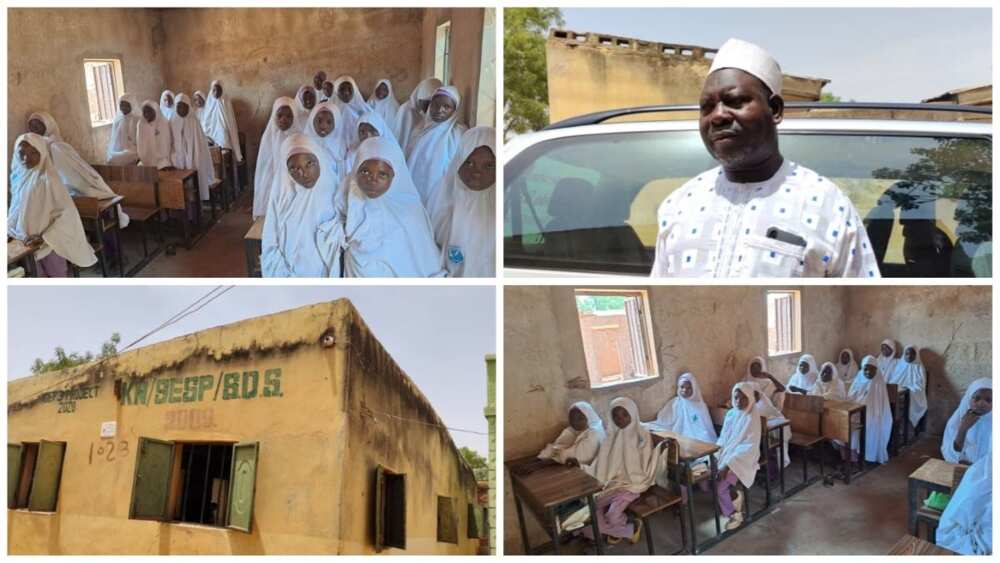
Source: UGC
He wants that for every other girl in Tarda community even as he believes that educating a girl is a responsibility which would not only be beneficial to the lives of young ones, parents or the immediate community but Nigeria as a whole.
However, living in a country like Nigeria where over 40 per cent of girls are married before their 18th birthday according to a publication, Child Marriage in West and Central Africa: At a Glance, Abdullahi has to work twice as hard to actualise his dream of girls' enrollment in schools.
PAY ATTENTION: Join Legit.ng Telegram channel! Never miss important updates!
The publication by the United Nations Populations Fund and UNICEF states that the percentage of girls who marry before they turn 18 years accounts for an estimated 22 million child brides who live in Nigeria and mostly in the northern part of the country.
Legit.ng gathered that many of the girls when they are married off, find it difficult to return to the walls of education either due to responsibilities on the homefront or shame of mingling with others who might be younger.
But for Abdullahi, the reverse is the case, the SBMC makes education appealing to these girls by making them learn in a place of comfort.
He strongly believes that:
"It doesn't matter whether they are already married, we just want all our girls to get the best education here in Ungogo."
Fighting the tide through SBMC and GEP 3
As the SBMC chairman, Abdullahi coordinates activities in Government Girls' Junior Arabic Secondary School Trada (GGJASS) where married young girls are admitted with the pursuit that they at least complete their basic education.
The goal of the SBMC policy is to improve learning outcomes by encouraging increased state governments' commitment to strengthen agencies to ensure inclusiveness in the management of schools, full community participation through improved advocacy and resource mobilization, communities taking ownership of schools, improved transparency and accountability on the part of all stakeholders and increased enrolment, retention of children in schools.

Read also
2023: Women, girls’ inclusion is Nigeria's chance at development and accountability, says CSOs
Also, Abdullahi's commitment is complemented by the Girls Education Project (GEP 3) initiative introduced by the United Nations Children’s Fund (UNICEF) with the support of the Foreign, Commonwealth and Development Office (FCDO).
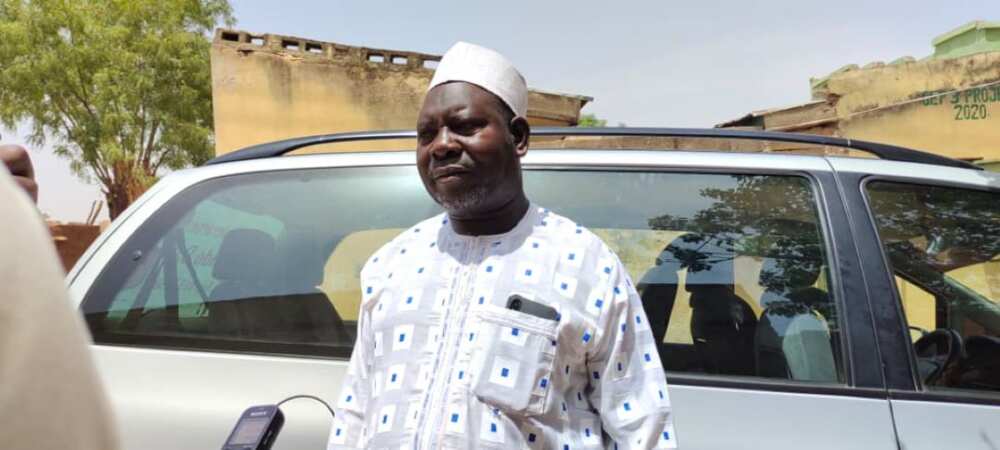
Source: UGC
The initiative is aimed at changing the narrative of girls’ education in Northern Nigeria and improving the enrollment, retention and completion of basic education by female children across the region of the country.
With the implementation in six northern states of Kano, Katsina, Sokoto, Bauchi, Zamfara and Niger states in 2012, GEP 3 is expected to get one million girls into school in order to improve their social and economic opportunities.
That, Legit.ng gathered is the drive for Abdullahi who affirmed that education is a basic right - not just for male children but for females too.
Why Ungogo in Kano state?
Speaking passionately about his dream, Abdullahi said development is part of life and to achieve that in Ungogo LGA, education must be on the front-burner of every discourse.
He also believes that the gap created by child marriage in the northern part of the country can be closed up should everyone contribute their quota to ensuring that no child, especially girls, is left out.
Also, the Multiple Indicator Cluster Survey (MICS), 2017 indicates that on average girls in Kano have less than a 50 per cent chance of enrolling in primary school and a 30 per cent less chance of transitioning into secondary school.
The survey shows that a girl from a poor home in the northern region of Nigeria has a 24 per cent chance of enrolling in primary school and only a nine per cent opportunity of enrolling in secondary. This is compared to the 87 per cent chance and 79 per cent chance for primary and secondary schools, respectively, enjoyed by their contemporaries in the south-south region
Hammering on policies and actions that needed to be taken by government and stakeholders to end child marriage, the report says that investing in education and the health of young people, particularly young girls is key.
Continuing, the SBMC chairman said he has seen first-hand what deliberate investment in education for girls does in the lives of members of households in several parts of the country and beyond.
That is why the GGJASS runs a combination of Western and Islamic Studies which not only admits young girls but also those who are married and may have dropped out of school across the local government area.
Abdullahi said:
"What we do in the SBMC as a committee is to make sure that no child, no matter your gender is left out.
"When we found out that the challenge was that many girls who were already married and dropped out of school needed to take care of the homefront, we found ways to tweak the system in their favour.
"So, now we run three sessions in the school - morning, afternoon and weekend."
Explaining further, the education advocate said that while some of the pupils attend the morning session, those who cannot make it enrol for the afternoon session.
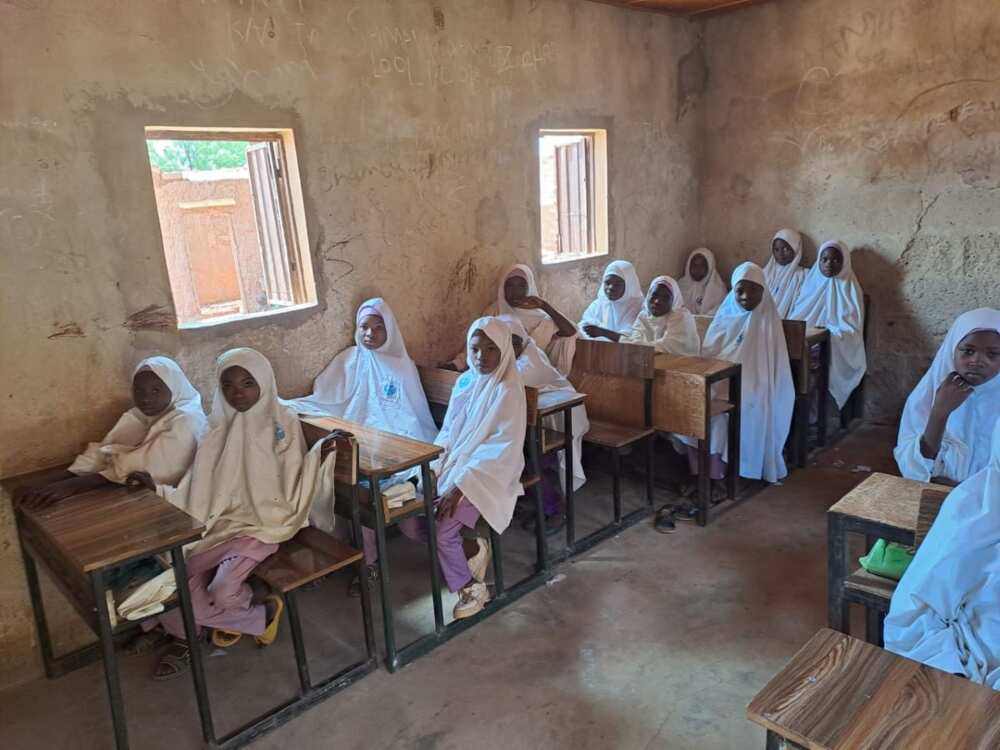
Source: UGC
Securing an unusual opportunity for married young girls and dropouts
With pupils studying between Mondays and Friday, the SBMC created a window of opportunity for the married young girls on weekends.
The married girls in Tarda community are enrolled in the GGJASS, they attend classes every Saturday and Sunday.
Abdullahi confirmed that what the community has achieved with this is that the young married girls find themselves among their "peers".
His words:
"What we have achieved with this is that you don't find them ashamed of anything because they are in the midst of people who they believe they are on the same level with.
"They do not feel like the younger ones or think that the other students are laugh or make a mockery of them because they are married or too old to be in school."
Some challenges faced by the institution
However, calling for government intervention, Abdulahi said the school-built PTE has been standing for over 30 years and would need to be refurbished in order to contain the growing number of enrollment.
Legit.ng also gathered that most residents of the Tarda community who do not want to face the challenge of transporting their children far distances to acquire education end up leaving them at home.
"This defeats our aim in the committee if the school is big enough we can have more children, especially the girl who might not be allowed to go the far distance in pursuit of education.
"At first, we used to come together, to provide stipends for parents as transportation to Ungogo primary and secondary school until this building was constructed.
"We also need desks and learning materials for the children," he added.
Ungogo Mothers taking the centre stage
For Asmau Mustapha, a member of the Mother’s Association in Ungogo, the group have continued to seek ways to encourage parents to send their girls to school.
Mustapha confirmed that women in the LGA receive a conditional cash transfer of N45,000 through the UNICEF and the FCDO GEP 3 initiative. The amount is paid twice directly into the child's mother's bank accounts and infused into their businesses thereby upscaling the wellbeing of their household.
For Mustapha, while the funds have continued to help families solve the problems associated with not sending their girls to school, they fear that the initiative which would be ending in September might hamper the milestones already gained in the LGA.
She further called on the Kano state government to take over the initiative to ensure its sustainability and improve on the already achieved successes.
Stating that there has been a drastic reduction of out-of-school girls in the locality, Mustapha called for the employment of female teachers in the school.
According to her, the presence of female teachers in the school would build parents' confidence in allowing their girls to attend classes.
She said:
"Before this programme, only two towns around here sent there children to school located here, but surprisingly, other towns around now send their children to school.
“This is a milestone achievement as it has improved enrolment in the school and so we want it sustained beyond September.

Read also
Goosebumps, shouts as 8-year-old girl delivers emotional speech as Peter Obi visits Houston, video emerges
"The SBMC constituted female committees move from house-to-house to enlighten parents on the need to send their children to school.
“This committee has done a lot in positively influencing parents and the result is the increase in enrolment of the girl-child we see in many of our schools in Kano State."
Highlighting the importance of collective support and input in sending every girl-child to school
The Chief of Field Office, UNICEF Field Office Kano, Rahama Farah, at a media dialogue in Kano said that girls in Nigeria bear a sizeable burden of the challenges that confront the country’s education sector.
Noting that there are 18.5 million out-of-school children, 60 per cent of which are girls, Farah said that the implication of this is that there are over 10 million girls who are out of school.
He added:
“Most importantly, you will need to know that the majority of these out-of-school children are actually from Northern Nigeria."
This situation has heightened the gender inequity, where only one out of four girls from poor, rural families, complete Junior Secondary School education.
Also, the education crisis in Nigeria affects children across the country, where some are more likely to be affected than others, especially girls.
The situation with girls’ education in Nigeria, Farah stressed, has been further exacerbated by terrorists' attacks on schools.
He said:
“These attacks have created an insecure learning environment, and discouraged parents and caregivers from sending their children to schools.
“At the same time, the students themselves become fearful of going to school. These attacks have particularly and specifically targeted girls."
Farah, however, highlighted the importance of collective support from every ally and stakeholder, especially the media in ensuring that every child was enrolled, retained and complete his/her education.
Education experts reveal why Nigeria is experiencing low learning outcomes
Legit.ng had earlier reported that experts across the country have called for strategic approaches to improving learning outcomes in school children.
The experts warned that 70 per cent of the children who are currently in school are not even learning.
According to them, there is also a need for all stakeholders in education to work towards ensuring teachers' development bearing in mind, the importance of training and retraining school instructors.
How 12-year-old chairman of children's committee encourages Kano kids to go to school
Twelve-year-old Habibu Usman who served as the chairman of a children's committee ensures kids do not drop out of school in Gwale local government of Kano state.
Habibu said his committee embarks on a house-to-house to enlighten parents and children on the need for basic education in life.
According to Habibu, the house-to-house campaign has successfully helped to increase the number of school children in Gwale.
Source: Legit.ng



